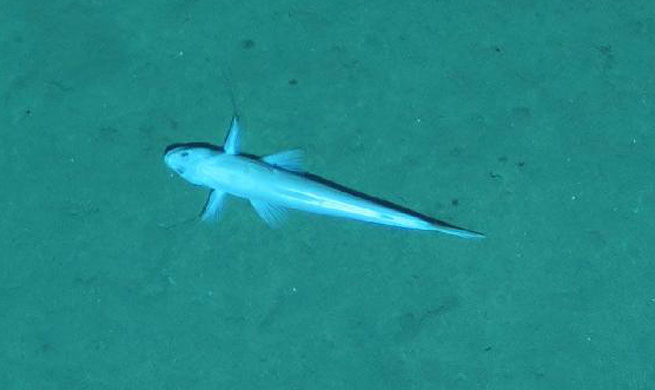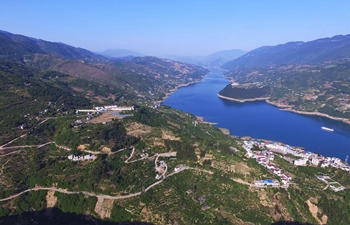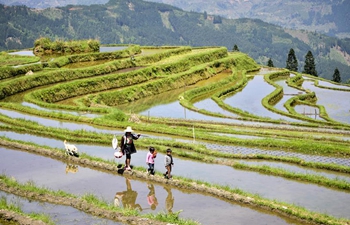CHENGDU, April 22 (Xinhua) -- Huang Yi, Party chief of Qingping Township, in southwest China's Sichuan Province, has received countless calls asking the whereabouts of fireworms.
In recent years, many parents have brought their children to visit Jiuding Mountain in the township, to view fireworms, which were almost extinct in the mountain due to mining activities.
Jiuding Mountain, one of China's four phosphorite mining bases, has a reserve of 170 million tonnes.
Huang said that phosphorite industries once accounted for 43 percent of local industrial revenue and could provide 30,000 jobs. But the mines and construction projects have taken a toll on the environment.
"We can't continue the old ways of polluting first, treating second," said Shi Lei, deputy mayor of Mianzhu, which administers Qingping Township. "We must take the initiative to transform our industries."
Last year, all the mines on the mountain were closed. A team of environmental police cooperated with river chiefs to patrol day and night.
As China observes the 49th Earth Day, Sichuan Province is seeing environmental improvements.
In Xingfu Village in Sichuan's Qingchuan County, the transformation of the local fishing industry in recent years has also highlighted the government's efforts to put more focus of protecting the environment.
Li Huangui, 47, is a resident of Xingfu, which meaning happiness in Chinese. Li used to farm fish, raising them in net cages.
In 1996, locals were forced to relocate after the construction of the White Dragon Lake reservoir inundated their land. With less land to grow crops, villagers in Xingfu began to raise fish in the reservoir.
Li started farming fish in 2006, when he returned from being a migrant worker in the city. He bought more than 40 cages and had one of the biggest fish farms in the village. His business started to profit in 2008, and annual revenue reached about 200,000 yuan (31,800 U.S.dollars).
"At its height, there were more than 900 cages in the village," said Shen Lianxue, a village official.
While the fishing industry grew, the water quality in the lake plummeted, threatening the safety of drinking water.
"When the wind blew, you could smell the odor of dead fish," Li said. "Dead fish were scattered everywhere around the lake."
The deteriorating water quality also threatened Li's business, with fish yield decreasing and costs rising significantly.
In 2014, the local government banned the fishing industry, and helped local farmers to move into the tourism industry.
Li answered the government call by closing his fish farm and opening a guesthouse where he provides catering services and accommodation for visitors.
"Currently, my profit is around 100,000 yuan a year," Li said. "Although it does not compare to the past, I am looking at long-term development."
After several years of protection, the lake's water quality has greatly improved, according to the county government. The area near White Dragon Lake has become a popular tourist destination.
"I believe the future will be better," Li said.

















